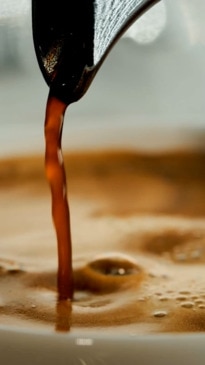
If you struggle to socialise without a drink in hand or find yourself counting down the hours until midday, it could be time to reevaluate your relationship with the bottle, experts say.
With its festive cheer and celebrations, the Christmas and New Year period is the time of the year that brings people together for joyous occasions. For many, it’s a time to unwind, enjoy the company of loved ones, and indulge in a few drinks.
Societal norms often dictate a celebratory toast, reinforcing the expectation that joyous moments must be accompanied by clinking glasses and sipping spirits. However, amidst the merriment, it’s crucial to notice when drinking crosses the line from social enjoyment to a potential problem.
After a busy working year and juggling the responsibilities of her three children, Natasha* was looking forward to her many end-of-year Christmas parties and celebrations last year.

“My December was packed with long lunches with different friendship groups, two work Christmas parties, a four-day beach getaway with my mum’s group, plus the regular Christmas Day and Boxing Day lunches with the family,” she recalls. “I think a lot of people have a similar end-of-year scenario.”
Day-to-day, Natasha would usually drink one or two glasses of wine in the evening to unwind after a busy day, however, over the holiday period this increased dramatically, and by the end of January, Natasha had found herself drinking up to two bottles of wine a day.
“It was Australia Day and we were with extended family. The kids were in the pool with their cousins, and I began to get shaky as I watched them splashing about. All I could think about was having a glass of wine, but it was only 10am. I was too embarrassed to suggest that we open a bottle that early in the morning.”
Natasha immediately knew she was having withdrawal symptoms. “That was a real low point. A close family member of mine had struggled with their drinking in the past, so I recognised the signs. I knew I needed help quickly, so I entered a rehab facility.”
There are plenty of others like Natasha whose drinking increases significantly over the holiday period. It’s easy to embrace the joyous spirit with loved ones and a few celebratory drinks.
However, as we revel in the holiday cheer, it’s essential to remain mindful of the thin line between social enjoyment and when drinking transcends celebration. Here are the signs that indicate your drinking may be becoming a problem:
You can’t socialise without a drink
During the holiday season, social gatherings are abundant. While enjoying a drink in moderation is a common part of celebrations, pay attention if you find yourself relying on alcohol to navigate social situations or cope with stress.
If the idea of attending events without alcohol becomes daunting or if you feel uncomfortable without a drink in hand, it may be time to assess your relationship with alcohol. This is a challenge but not impossible. We always need to reach out if we become concerned about our reliance on alcohol – help is available.
The frequency and quantity have increased
Take stock of how often you find yourself reaching for a drink. The holiday season, with its numerous festivities, can sometimes blur the lines between occasional indulgence and regular consumption.
If you notice a significant increase in your drinking frequency or if you find it challenging to limit the quantity, it’s a red flag that warrants consideration.
Your tolerance has escalated
Alcohol tolerance refers to the body’s adaptation to regular consumption, leading to a diminished response to the same amount of alcohol. If you notice that you need more drinks to feel less stressed and more relaxed, or if you find yourself seeking stronger beverages, it’s an indication that your body is becoming tolerant, and your drinking habits may be escalating.
If you experience blackouts, where you’ve been present at the event but have no memory of it, alcohol may be becoming a problem for you, and it’s important to address this with a healthcare professional.
Impaired control
Losing control over your drinking is a critical sign of a potential problem. If you struggle to set limits and consistently find yourself drinking more than intended, it’s essential to evaluate whether your relationship with alcohol is contributing to impaired decision-making.
You may tell yourself time and time again you will only have one or two drinks today and exceed that number every time. You may even think to yourself, I won’t drink today, only to find yourself halfway through a bottle.
Neglecting responsibilities
The holiday season can be hectic, balancing festivities with work, family, and personal obligations. Have you woken up late after a night of drinking and struggled to get to the office on time or the children to school?
If you notice a decline in your ability to fulfil responsibilities, whether at home, work, or in relationships, and if alcohol use is a contributing factor, it’s crucial to address the impact of your drinking on your daily life.
Is alcohol costing you more than money? Is it costing you connected and peaceful relationships with your partner, children, extended family and friends? Do you think to yourself, this is not like me, or do you blame others for how you are?
Mood and behavioural changes
Be attentive to shifts in your mood and behaviour associated with drinking. If alcohol begins to affect your emotional well-being, leading to increased irritability, and mood swings, or if you find yourself engaging in risky behaviours under the influence, it’s a clear indication that your drinking habits are impacting your mental health.
Family and friends have voiced concerns
Sometimes, those closest to us notice changes before we do. They may even begin to question your drinking or express that they are noticing its impact on you. If family members or friends express concerns about your drinking, it’s essential to take their perspectives into account.
External observations can provide valuable insights into the impact of your drinking on both yourself and those around you. They are raising difficult issues because they are aware of the changes happening to you – changes you may not be aware of.
Try not to take their comments as criticisms, but rather as a means of them reaching out to you, because of how much they care for you.
When to seek professional guidance
If you recognise any of these signs in your behaviour over the Christmas and New Year period, seeking professional guidance is a proactive step toward a healthier relationship with alcohol.
Mental health professionals, addiction counsellors, or support groups can help. For those who are in early recovery, it’s particularly important to seek support during the festive period. Many clients in early recovery have a plan to keep themselves safe.
This may consist of attending functions where they can leave when ready or where they are comfortable not drinking; attending with a recovery friend and being able to discreetly step outside to call a friend for reassurance. Staying sober during this period can be difficult so plan to keep yourself on track.
*Name has been changed.
Diane Young is a psychotherapist at South Pacific Private, one of Australia’s leading trauma, addiction and mental health treatment centres.